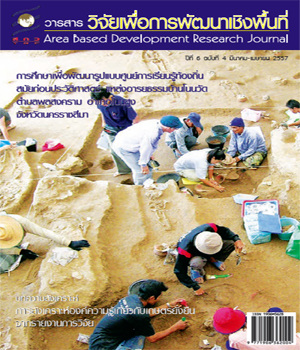การพัฒนาแบบจำลอง เพื่อพัฒนาการส่งเสริมพลังงานชุมชน กรณีศึกษา: องค์การบริหารส่วนตำบลสำนักตะคร้อ อำเภอเทพารักษ์ จังหวัดนครราชสีมา
Main Article Content
Abstract
งานวิจัยนี้เป็นการวิจัยกรณีศึกษาเพื่อพัฒนาแบบจำลองการพัฒนาพลังงานชุมชนที่มีประสิทธิภาพและประสิทธิผล ปฏิบัติได้อย่างเป็นรูปธรรมโดยปรับใช้วิธีวิทยาการวิจัยเชิงปฏิบัติการแบบมีส่วนร่วม (Participatory Action Research – PAR) วัตถุประสงค์ของงานวิจัย คือ เพื่อสร้างรูปแบบการพัฒนา และส่งเสริมพลังงานชุมชนที่มีประสิทธิภาพ สามารถนำไปใช้ได้ พื้นที่การวิจัย คือ ตำบลสำนักตะคร้อ อำเภอเทพารักษ์ จังหวัดนครราชสีมา ประชากรที่ใช้ในการวิจัยครั้งนี้ คือ ครัวเรือนในพื้นที่ตำบลสำนักตะคร้อ อำเภอเทพารักษ์ จังหวัดนครราชสีมา จำนวน 1,824 ครัวเรือน โดยกำหนดขนาดของกลุ่มตัวอย่างตามวิธีของ ทาโร ยามาเน (Taro Yamane, 1970) ได้กลุ่มตัวอย่างของพื้นที่ตำบลสำนักตะคร้อ เท่ากับ 328 ครัวเรือน เครื่องมือที่ใช้ในการวิจัย 1. โครงการจัดทำแผนพลังงานในระดับชุมชนกระทรวงพลังงาน ตามหลักการพัฒนาคุณภาพการบริหารจัดการภาครัฐ (PMQA) 2. การวิเคราะห์องค์กร (SWOT Analysis) 3. การสนทนากลุ่ม (Focus Group Discussion) 4. แบบสอบถาม จุดมุ่งหมายในการศึกษาครั้งนี้ เพื่อศึกษารูปแบบ การพัฒนาการส่งเสริมเทคโนโลยีพลังงานสู่ชุมชนในพื้นที่ ตำบลสำนักตะคร้อ อำเภอเทพารักษ์ จังหวัดนครราชสีมา ซึ่งได้ประยุกต์จากการดำเนินตามขั้นตอน บัญญัติ 10 ประการ 162 ชุมชนของกระทรวงพลังงาน เพื่อสร้างรูปแบบการพัฒนาศักยภาพการพัฒนาการส่งเสริมเทคโนโลยีด้านพลังงานทดแทนสำหรับชุมชน โดยการเข้าไปร่วมดำเนินการพัฒนาและศึกษาศักยภาพด้านพลังงานทดแทนและเทคโนโลยีกับทางชุมชน โดยมีขั้นตอนการดำเนินการเก็บข้อมูลของชุมชนมาเพื่อวิเคราะห์จุดอ่อนจุดแข็ง (SWOT analysis) ร่วมกับกระบวนการแลกเปลี่ยนความรู้แบบกลุ่ม (Focus Group) เพื่อหาตัวแปรที่ก่อให้เกิดปัญหาต่อการพัฒนาภายในชุมชน แล้วนำมาแก้ปัญหาโดยใช้กระบวนการทางมานุษยวิทยา (Anthropological Method) และเน้นการมีส่วนร่วมของชุมชนมาออกแบบตัวอย่างเพื่อนำมาเป็นต้นแบบ แล้วนำไปทดลองเพื่อประเมินประสิทธิผล โดยเปรียบเทียบกับการดำเนินตามขั้นตอนบัญญัติ 10 ประการของกระทรวงพลังงาน จากผลการดำเนินการพบว่า รูปแบบการส่งเสริมพลังงานชุมชนที่มีประสิทธิภาพประสิทธิผลมีลำดับขั้นตอน คือเข้าถึงชุมชน ศึกษาเรียนรู้ชุมชน วางแผนโดยใช้หลักอริยสัจ4 ปฏิบัติการและสรุปบทเรียน ตามลำดับ กระบวนการพัฒนาดังกล่าวทำให้ได้ผลรับดี ในด้านความร่วมมือ ความเข้าใจ และยังช่วยลดระยะเวลาในการพัฒนาและส่งเสริมทางด้านพลังงานทดแทนของแต่ละชุมชนให้สั้นลงและมีประสิทธิภาพมากยิ่งๆขึ้น
Development of Model to Support Community Energy Case Study : Local Administration Bureau Samnak Thakhro Sub-district, Theparak District, Nakhorn Ratchasima Province
This research's objective is to create a development model for an efficient management of energy sources in the community using Participatory Action Research or PAR. This model has been implemented in the research area at Samnak Takhro Sub-district, Teparak District Nakhon Ratchasima Province. We sampled a population of 328 from 1,824 households according to the method proposed by Taro Yamane(Taro Yamane, 1970). The tools employed to conduct our research are 1.) The community-level energy plan based on the Public Sector Management Quality Award or PMQA, set out by the Ministry of Energy 2.) SWOT analysis 3.) Focus Group Discussion 4.) Questionnaires Our development model was adapted from the "10 Principles for 162 Communities Project" by the Ministry of Energy in order to promote renewable energy consumption by developing local renewable energy sources. We used the SWOT analysis and focus group discussions to identify problems that obstructed the community development. Obstructions were solved by using anthropological methods emphasizing participation of local people. Results of the implementation were assessed by comparing them with the "10 principles" of the Ministry of Energy. We can conclude that the most efficient and successful approach for the energy development plan is to understand the community, learn from the community, plan the strategies using the Four Noble Truths, then operate and assess the results. Our method receives good results in cooperation and understanding between researchers and the local people. This leads to reduction of time consumed in development and promotion of renewable energy consumption.
Article Details
Area Based Development Research Journal values copyright protection and licensing to safeguard author rights and facilitate the appropriate dissemination of research. Our policies ensure openness, accessibility, and attribution. Authors retain copyright ownership, and articles are published under a Creative Commons Attribution License (CC BY), allowing sharing, adaptation, and proper attribution. Authors have the freedom to publish under the CC BY license, granting broad reuse and distribution permissions. The journal supports posting articles on third-party repositories, adhering to institutional and funding restrictions. Author guidelines detail copyright and licensing requirements, empowering authors with knowledge about their rights and responsibilities. These policies cultivate an environment of collaboration, openness, and responsible sharing, benefiting authors and the research community while honoring intellectual property rights.


